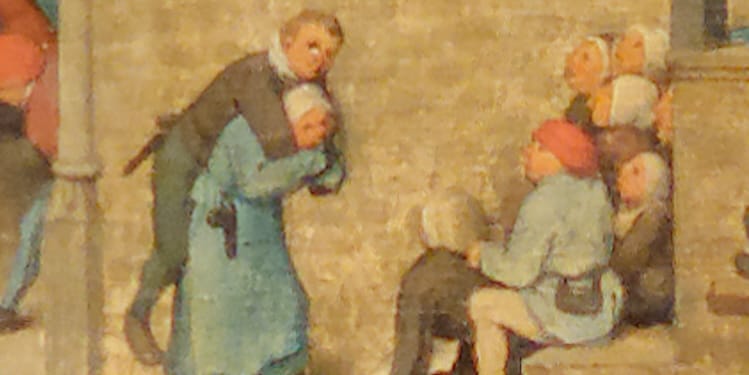Vanessa Springora’s Surname (Patronyme), is as striking for the rigour of her approach, as for her assumption of a dare to know at the very place where everything plays in favour of discouragement. The investigation she decides to conduct in the after-effect (après-coup) of the contingent unveiling of an area of horror in her family history, is a long journey fraught with obstacles. Her position as a subject who confronts them while giving full weight to each person’s subjective responsibility is remarkable.
When her father, who had withdrawn into the mystery of his madness during the last years of his life, dies, Springora comes across two photos of her paternal grandfather, ‘‘a Czech refugee who was always presented to me as a hero’’. [1] As soon as she reads a mysterious letter ‘‘S’’ [2] on a piece of clothing surrounded by Nazi insignia, the writer knows that deciphering her grandfather’s precise involvement in the barbarity will turn everything upside down. It will shed a harsh light on the most opaque aspects of family subjectivity spanning three generations. Vacillations, gaps, wanderings in the jungle of archives, and dread at each new clue patiently uncovered, fail to make her look away. Here, wanting to know is an act: that of being ready to accept both the upheaval and the light it will shed on the point from which she was reading her history and looking at her life.
The manner in which Springora traces the thread of her questioning is of the same fabric as the analysand’s approach, who does not stop at the horror of knowing. It is a gamble to follow the trail of a purloined letter, with only the recognition of a childhood feeling pointing to a real to be uncovered: ‘‘All my life, I have been confronted with the strangeness of my name. […] A confused sentiment of shame and illegitimacy, not to say imposture, then descended upon me’’. [3] The writer retraces her steps on the road to the Name-of-the-Father, whose signposts have been cut down, with only tiny clues to guide her: a letter erased, replaced by another, a cut, an addition. Yet the desire to know precedes the breach of the family secret. It finds its source in the thick fog of the Name-of-the-Father and the hole left by the disappearance from Springora’s life, since she was eleven, of the one who spent his life deluding himself about fictitious exploits and ‘‘creating a family novel worthy of the high opinion he had of himself’’ [4]: ‘‘What that name meant to me was a nebulous origin, another place I knew nothing about and in which I refused to take any interest for a long time, because it came from a father who had deserted my life’’. [5]
She admits that her initial reaction was, for two years, to close the chapter on her grandfather in Nazi uniform. The pulsing of the unconscious insisted and thwarted her desire to sleep: “ ‘‘I noticed a kind of inhibition in myself whenever I have to come up with certain names on the spot, especially those of writers and artists I have known all my life’’. [6] She resolves to take note of these formations of the unconscious: “This name that my father passed on to me, the only thing that connects me to him now, I got from someone who is eternally absent.” [7] She will now have to draw a logical thread between this and other holes: “On the baptism certificate, the letters of the name ‘‘Springer’’ are very spaced out and after the final ‘‘r’’, there is an empty space with a small hole in it, as if made by a cigarette burn. […] after the final ‘‘r’’ of the name ‘‘Springer’’, a letter (invisible because it does not exist) gives the impression of having been rubbed out or effaced’’. [8]
Notably, she confides that her desire to uncover what lies behind the distorted surname, which she had tried to repress, only resurfaced with the sudden awakening caused by the return of war in Europe. Russia’s invasion of Ukraine confronts her with a real she no longer wants to avoid: ‘‘This certainty of impending catastrophe, this fear of experiencing war myself, came back to haunt me, superimposed on the figure of my grandfather. Without further explanation, my mind turned to the old piece of furniture that, for two years, had jealously guarded the secrets of my paternal family’’. [9]
[1] Springora, V., Patronyme, Paris : Éditions Grasset & Fasquelle, 2025, p. 82.
[2] Ibid., p. 86.
[3] Ibid., p. 20-21.
[4] Ibid., p. 59.
[5] Ibid., p. 21.
[6] Ibid., p. 97.
[7] Ibid., p. 98.
[8] Ibid., p. 117.
[9] Ibid., p. 104.
Translated by Alasdair Duncan
Proofreading by Laurence Maman







